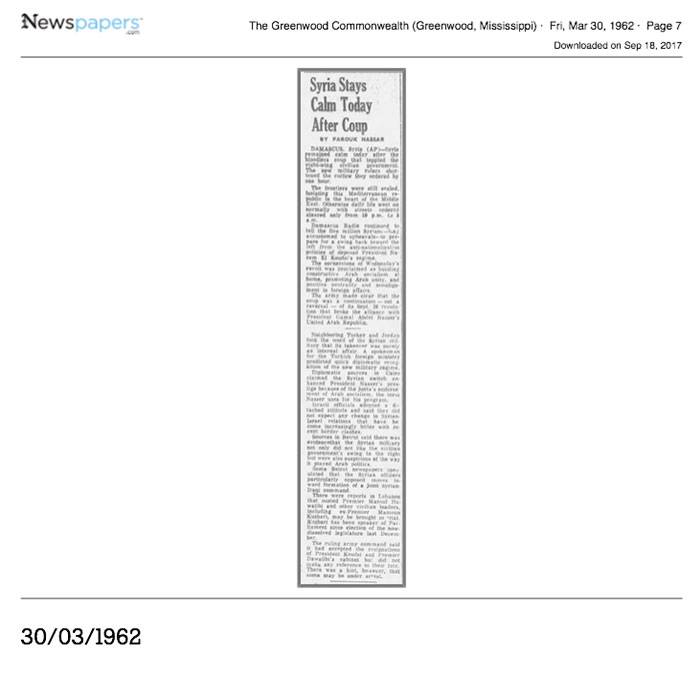Syria Stays Calm Today After Coup - 30/02/1962
Syria Stays Calm Today After Coup
Farouk Nassar
Associated Press
DAMASCUS, Syria (AP) - Syria remained calm today after the bloodless coup that toppled the right-wing civilian government. The new military rulers shortened the curfew they ordered by one hour.
The frontiers were still sealed, isolating the Mediterranean republic in the heart of the Middle East. Otherwise daily life went on normally with streets ordered cleared only from 10 p.m. to 5 a.m.
Damascus Radio continued to tell the five million Syrians - long accustomed to upheavals - tp prepare for a swing back toward the left from the anti-nationalization policies of deposed President Nazem El Koudsi’s regime.
The cornerstone of Wednesday’s revolt was proclaimed as building constructive Arab socialism at home, promoting Arab unity, and positive neutrality and nonalignment in foreign affairs.
The army made clear that the coup was a continuation - not a reversal - of its Sept. 28 revolution that broke the alliance with President Gamal Abdel Nasser’s United Arab Republic.
Neighbouring Turkey and Jordan took the word of the Syrian military that its takeover was purely an internal affair. A spokesman for the Turkish foreign ministry predicted quick diplomatic recognition of the new military regime.
Diplomatic sources in Cairo claimed the Syrian switch enhanced President Nasser’s prestige because of the junta’s endorsement of Arab socialism, the term Nasser uses for his program.
Israeli officials adopted a detached attitude and said they did not expect any change in the Syrian-Israeli relations that have become increasingly bitter with recent border clashes.
Sources in Beirut said there was evidence that the Syrian military not only did not like the civilian government’s swing to the right but were also suspicious of the way it played Arab politics
Some Beirut newspapers speculated that the Syrian officers particularly opposed moves to ward formation of a joint Syrian-Iraqi command.
There were reports in Lebanon that ousted Premier Maroud Dawalibi and other civilian leaders, including ex-Premier Mamoun Kuzbari, may be brought to trial. Kuzbari has been speaker of Parliament since election of the new dissolved legislature last December.
The ruling army command said it had accepted the resignations of President Koudis and Premier Dawalibi’s cabinet but did not make any reference to their fate. There was a hint, however, that some may be under arrest.
